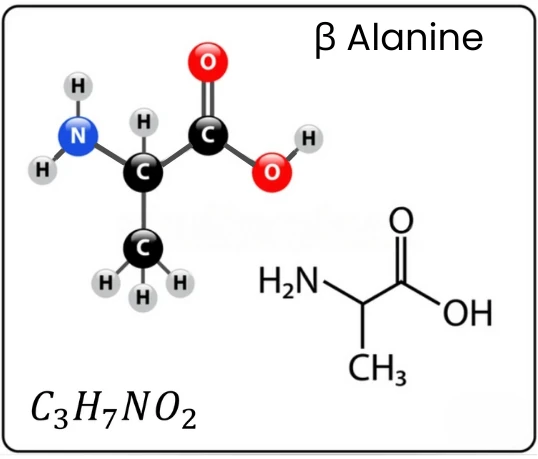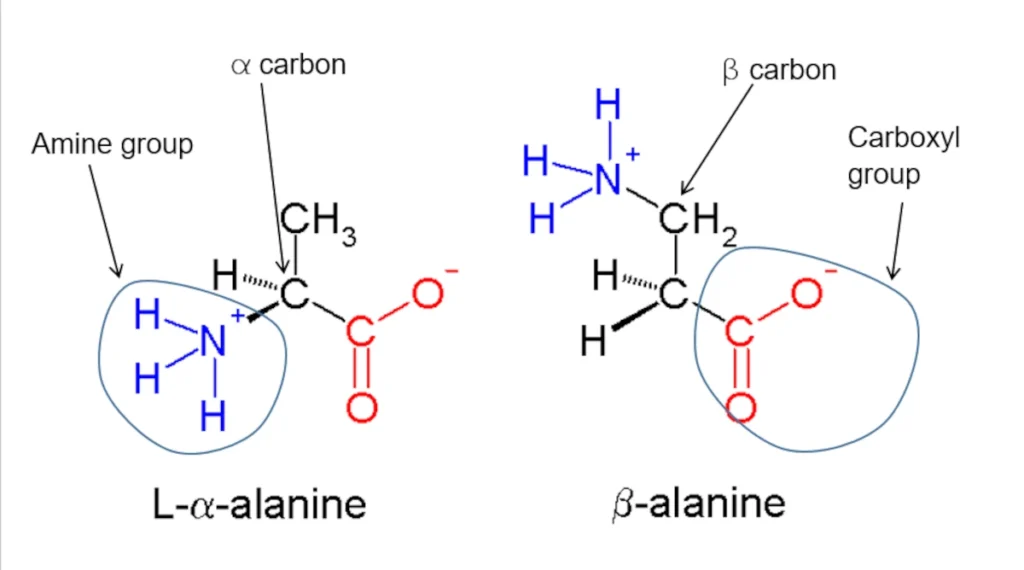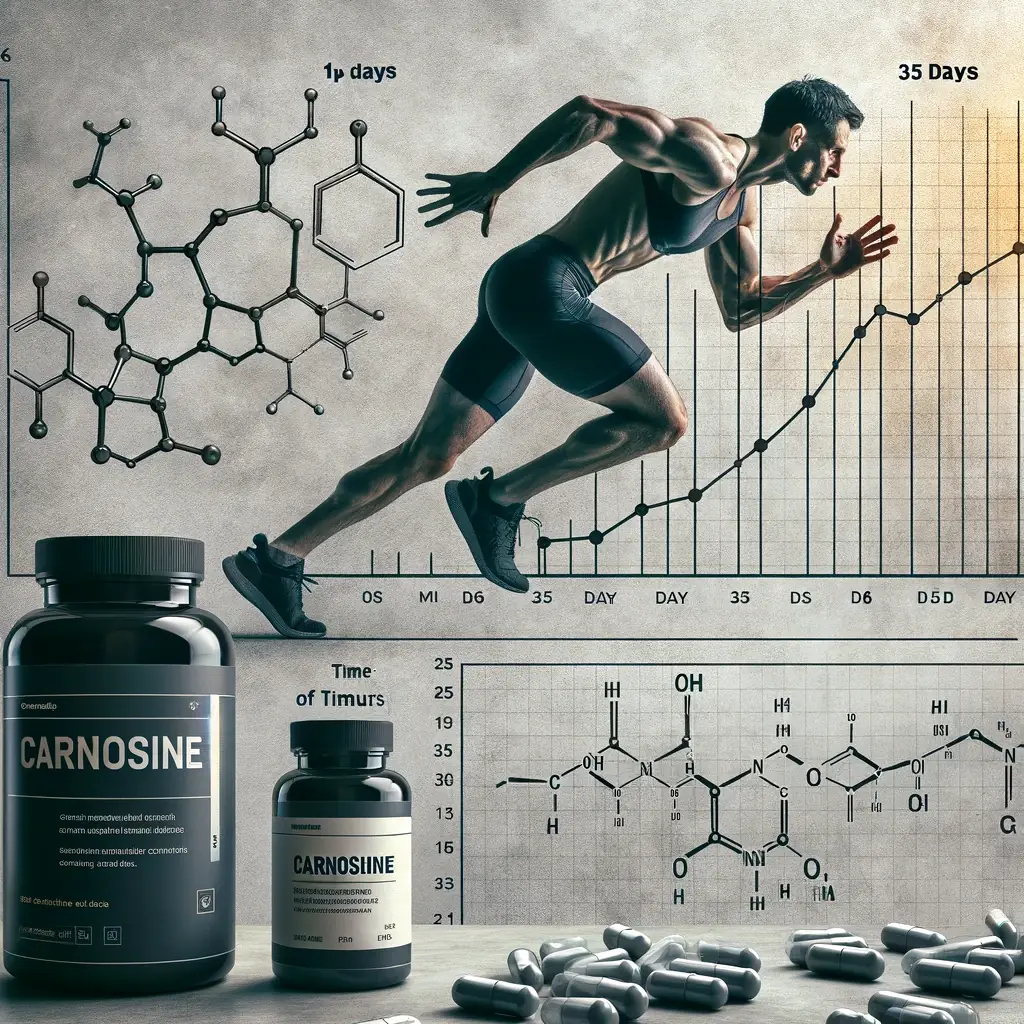Are you ready to challenge the limits of your endurance and strength?
Unveil the surprising truths behind Beta Alanine benefits and see how this powerhouse supplement can transform not just your workouts but your entire approach to fitness and well-being!
In the world of athletic performance, every edge counts. Understanding supplements like Beta-Alanine is not just about gaining an advantage; it’s about respecting the incredible machinery of our bodies.
– Dr. Emma Richards, a renowned sports nutritionist
Stay informed and up-to-date with the latest scientific findings and expert opinions in this thorough examination of Beta-Alanine, including its benefits, dosage, side effects, and much more.
Introduction
In the realm of performance-enhancing supplements, Beta-Alanine has emerged as a standout contender, revered for its remarkable ability to boost physical capabilities. This non-essential amino acid has swiftly carved out a niche in the fitness and health industry, drawing attention for its unique role in enhancing athletic performance and overall well-being.
Beta-Alanine is primarily recognised for its efficacy in increasing muscle endurance, particularly during high-intensity activities. By boosting the synthesis of carnosine, a compound that plays a key role in muscle endurance, Beta-Alanine helps athletes and fitness enthusiasts push their limits and achieve new heights in their physical pursuits. Whether it’s for professional athletes striving for peak performance or everyday fitness enthusiasts looking to improve their workout endurance, Beta-Alanine offers a tangible boost that is backed by scientific research.
In the world of fitness and sports, Beta-Alanine has rapidly gained traction, becoming a go-to pre-workout supplement for athletes and fitness aficionados alike. Its growing popularity stems from its proven ability to enhance endurance and improve workout efficiency, making it a buzzworthy topic in gyms and athletic circles.
From the weight room to the final lap, Beta-Alanine has been a game-changer in my training routine. It’s not just about pushing harder; it’s about lasting longer and recovering faster. This supplement has become a non-negotiable part of my regimen.
Alex Stone, Champion Bodybuilder

As we dive deeper into the nuances of Beta Alanine benefits, we’ll uncover the spectrum of its benefits, understand the optimal ways to harness its potential and navigate through the best practices for its use.
Join us as we explore the multifaceted world of Beta-Alanine and discover how this powerful supplement can be a game-changer in your health and fitness journey.
What is Beta Alanine?
Beta-Alanine has gained prominence in the realm of sports nutrition as a supplement that enhances physical performance. To appreciate its significance, it is essential to understand its structure and function within the body.
Beta-Alanine’s Structure
At a molecular level, Beta-Alanine is characterised by its simple yet distinct chemical makeup. It consists of a chain of three carbon atoms, with the amino group attached to the beta-carbon. This structural arrangement is what differentiates Beta-Alanine from the more common alpha-amino acids found in proteins. In alpha-amino acids, the amino group is attached to the alpha carbon, which is directly adjacent to the carboxyl group. The unique positioning of the amino group in Beta-Alanine plays a critical role in its biological function, particularly in synthesising carnosine.

Regarding its structure, Beta-Alanine is characterised by its simple yet distinct chemical makeup. It consists of a chain of three carbon atoms, with the amino group attached to the beta carbon, a feature that sets it apart from the more common alpha-amino acids found in proteins. This structural uniqueness is pivotal in its role within the body, specifically in synthesising carnosine.
Role in the Body
The primary role of Beta-Alanine is to synthesize carnosine, a dipeptide abundantly found in skeletal muscles. Carnosine is essential for buffering the hydrogen ions (H+) produced during high-intensity exercise. These ions contribute to muscle acidity and, subsequently, fatigue. Beta-Alanine’s unique structure allows it to efficiently combine with histidine, another amino acid, to form carnosine. This process is pivotal in enhancing muscle endurance and reducing fatigue, particularly during short bursts of intense physical activity.
A significant study by Derave, W., et al. (2007), published in the Journal of Applied Physiology (103(5), 1736-1743), demonstrates this impact. The study found that Beta-Alanine supplementation significantly augments muscle carnosine content, thereby attenuating fatigue in trained sprinters during high-intensity exercises. This finding illustrates the direct correlation between Beta-Alanine supplementation and improved athletic performance.
Primary Benefits of Beta Alanine
Beta-Alanine has carved out its place as a cornerstone supplement in the fitness world, largely attributed to its remarkable influence on muscle carnosine levels. When consumed, Beta-Alanine journeys through the bloodstream to muscle cells, where it pairs up with histidine, another amino acid, leading to the synthesis of carnosine. This elevation in muscle carnosine levels is nothing short of transformative for those seeking to boost their athletic prowess.

Elevating Muscular Endurance
- Carnosine’s Power: The presence of increased carnosine in muscle tissues is a key factor in enhancing muscular endurance. Carnosine serves as a buffer, countering the acid build-up that occurs during intense exercise. This buffering action is crucial as it helps in maintaining the muscle pH balance, which is vital for sustained muscle performance and delaying fatigue.
- Research Insights: This connection between Beta-Alanine and enhanced exercise capacity was illustrated in a study by Hill, C. A., et al. (2007), published in Amino Acids. The research highlighted that supplementing with Beta-Alanine significantly boosts muscle carnosine content, leading to notable improvements in high-intensity exercise performance.
Combatting Lactic Acid Build-Up
- Lactic Acid and Muscle Fatigue: During high-intensity workouts, the body accumulates lactic acid, leading to an increase in hydrogen ions and a drop in muscle pH, a primary culprit behind muscle fatigue. Beta-Alanine’s role in synthesising carnosine is pivotal here as it helps neutralise these ions, thus reducing the acidity in muscles.
- Delaying Muscle Fatigue: By acting as a buffer against hydrogen ions, carnosine helps postpone the onset of muscle fatigue, allowing athletes to perform at higher intensities for longer durations. The study by Derave, W., et al. (2007) in the Journal of Applied Physiology demonstrated how Beta-Alanine supplementation effectively reduces fatigue in athletes during repeated high-intensity exercise bouts.
In essence, Beta-Alanine’s ability to ramp up carnosine levels in muscles and its subsequent impact on reducing fatigue and enhancing endurance make it an invaluable tool for athletes and fitness enthusiasts alike. It’s this unique capability that underscores Beta-Alanine’s growing popularity in the realm of sports nutrition.
Yes, Beta-Alanine is known to enhance both strength and endurance. It has been shown to improve strength and power, particularly in exercises such as bench presses, squats, and star jumps, as observed in studies involving collegiate football players. In addition to strength, Beta-Alanine significantly boosts endurance in activities like running, cycling, and rowing. This is largely due to its ability to increase muscle carnosine levels, which helps buffer acid in muscles during intense physical activities, enhancing endurance performance.
Beta-Alanine boosts the level of carnosine in muscles. Carnosine is a buffer against the acid that builds up during high-intensity exercise, delaying muscle fatigue and enhancing performance.
Beta-Alanine’s benefits are cumulative, meaning they build up over time. Consistent supplementation over several weeks is essential for noticeable improvements in performance. Most studies suggest a period of at least 4 weeks to start seeing significant benefits.
Beta-Alanine emerges as a powerhouse supplement for diverse exercise routines. It enhances strength and power, turning challenging lifts and squats into achievable feats. In the realm of high-intensity interval training and team sports such as rugby and soccer, where repeated maximal effort is required, it boosts muscle endurance. It accelerates recovery, a boon for athletes seeking peak performance. Bodybuilders and strength trainers, too, find Beta-Alanine a key to longer, more intense workout sessions, leading to significant muscle growth and development. These benefits, which are backed by scientific research, make Beta-Alanine a versatile ally in various forms of physical training.
Beta-Alanine: Enhancing Performance across Athletic Disciplines
Beta-Alanine’s impact on athletic performance is not just anecdotal; it’s backed by scientific studies demonstrating its significant benefits for a wide range of athletes, including endurance competitors, high-intensity performers, and bodybuilders. The supplementation of Beta-Alanine has been shown to influence performance metrics positively across these varied fields.
Research on Performance Enhancement
- Endurance Athletes: For endurance athletes, mastering prolonged activities like running, cycling, and rowing is crucial. Beta-Alanine’s role in enhancing endurance was spotlighted in a significant 2017 study by Saunders, B., et al., published in the British Journal of Sports Medicine. This research meticulously analyzed Beta-Alanine’s impact on a range of endurance exercises, including exhaustive treadmill runs, 20 km cycling, 4 km runs, 2000 m rowing, 200 m swimming, and repeated 30 m sprints. The findings were clear: Beta-Alanine supplementation led to notable improvements in both the capacity and performance of these endurance activities, with the most significant enhancements observed in exercises lasting up to ten minutes..
- Strength and Power Athletes: In 2006, a pivotal study by researchers from the College of New Jersey examined the impact of Beta-Alanine supplementation on athletic performance, focusing on strength and power. The study involved 33 collegiate football players, tracking their progress in bench press and squats for strength, and star-jump exercises for power. The findings, published by Hoffman, J., et al. in the International Journal of Sports Nutrition and Exercise Metabolism, revealed significant enhancements in both strength and power among those who supplemented with Beta-Alanine. This research underscores Beta-Alanine’s effectiveness in boosting high-intensity training outcomes, making it a valuable supplement for athletes in strength and power sports.
Benefits for Diverse Athletic Groups
- High-Intensity Interval Training and Team Sports: High-Intensity Interval Training (HIIT) and team sports like rugby and soccer demand not just skill but also exceptional muscle endurance and the ability to quickly recover from acidic stress caused by intense exercise. Beta-Alanine steps into this arena as a powerhouse supplement. A study conducted by Ballinger, P.M. in 2014 and published in the Journal of Strength and Conditioning Research highlights its efficacy. This study found that athletes participating in team sports, which often involve repeated maximal efforts, experienced notable improvements in performance with Beta-Alanine supplementation. This reinforces its role as a key supplement for athletes in fast-paced, high-intensity sports environments.
- Bodybuilding and Strength Training: For bodybuilders and strength athletes, Beta-Alanine holds a special significance. A ground-breaking study by Hoffman, J., et al. (2006), published in the International Journal of Sport Nutrition and Exercise Metabolism, sheds light on this. The research found that Beta-Alanine is exceptionally effective in boosting training volume for these athletes. By enabling them to perform more repetitions and sets at higher intensities, Beta-Alanine plays a crucial role in facilitating muscle strength development and hypertrophy. This ability to push harder and for longer is a game-changer in strength training regimes, directly contributing to enhanced muscle growth and improved overall performance.
The array of benefits that Beta-Alanine offers across various athletic disciplines underscores its effectiveness as a versatile supplement. Whether aiming to boost endurance, amplify strength, or excel in high-intensity sports, Beta-Alanine presents a compelling addition to the nutritional regimens of diverse athletes, including bodybuilders seeking to maximise their workout gains.
Yes, numerous studies have validated Beta-Alanine’s role in boosting both strength and power. Notably, research involving collegiate football players who supplemented with Beta-Alanine revealed marked enhancements in strength-oriented exercises like bench presses and squats, as well as in power-focused activities such as star-jumps. This is illustrated in a study by Hoffman, J., et al. (2006), titled ‘Effect of creatine and beta-alanine supplementation on performance and endocrine responses in strength/power athletes,’ published in the International Journal of Sports Nutrition and Exercise Metabolism (16(4), 430-446).
Beta Alanine has been shown to significantly improve endurance in activities like running, cycling, and rowing. This is primarily due to its role in increasing muscle carnosine levels, which helps buffer acid in muscles during high-intensity activities. Reference Saunders, B., et al. (2017). “Beta-alanine supplementation to improve exercise capacity and performance: a systematic review and meta-analysis.” British Journal of Sports Medicine, 51(8), 658-669.
Beta-Alanine proves to be exceptionally beneficial for bodybuilders and strength trainers, primarily by increasing their training volume. It enables these athletes to engage in more intense and extended training sessions, significantly aiding in the development of muscle strength and promoting muscle hypertrophy. This effect is underscored in the study by Hoffman, J., et al. (2006), titled ‘Effect of Creatine and ß-Alanine Supplementation on Performance and Endocrine Responses in Strength/Power Athletes,’ published in the International Journal of Sport Nutrition and Exercise Metabolism, 16(4):430–446.
Indeed, Beta-Alanine proves highly beneficial for HIIT and team sports, such as rugby and soccer, which demand repeated bouts of maximum effort. It significantly enhances muscle endurance and assists in the recovery from the acidic stress caused by intense physical activity. This leads to a noticeable improvement in overall athletic performance. As referenced in Bellinger, P.M.’s 2014 study in the Journal of Strength and Conditioning Research (28(6):1751-70), Beta-Alanine supplementation is a key factor in optimizing performance in these demanding sports.
Additional Beta Alanine Benefits
Apart from its renowned benefits in athletic performance, Beta-Alanine has been associated with several other health benefits:
Antioxidant Properties:
- Beta-Alanine is thought to have antioxidant effects. Antioxidants play a vital role in combating oxidative stress and reducing cell damage caused by free radicals. While research is still evolving, the potential antioxidant effect of Beta-Alanine could contribute to overall health and wellness.
Cognitive Benefits:
- Some studies suggest that Beta-Alanine may have cognitive benefits, particularly under stress conditions or during ageing. This is attributed to its role in buffering pH changes in the brain, similar to how it works in muscles, although more research is needed to fully understand this aspect.
Effect on Erectile Dysfunction:
- Regarding erectile dysfunction, the direct impact of Beta-Alanine is not extensively studied or well-established in scientific literature. While Beta-Alanine improves blood flow and endurance, which could theoretically benefit erectile function, there is a lack of concrete research specifically linking Beta-Alanine supplementation to improved erectile dysfunction. It’s important to approach this potential benefit cautiously and consult healthcare professionals for advice on managing erectile dysfunction. Read this article to have a comprehensive overview of the effect of beta-alanine and other workout supplements on erectile function.
These additional health benefits of Beta-Alanine, while promising, require more research for conclusive evidence. Nevertheless, they point towards the broader potential of this supplement beyond just athletic performance enhancement.
Optimal Dosage of Beta-Alanine
The standard daily dosage of Beta-Alanine typically ranges from 2 to 5 grams. To maximize its benefits, it’s best to distribute this amount into smaller doses taken throughout the day, preferably with meals. This method ensures better absorption and enhances muscle carnosine loading.
Taking more than 800 mg of Beta-Alanine at once can lead to paraesthesia — a sensation of itchiness and tingling. To avoid this, splitting the daily dose into smaller quantities is advised. Slow-release formulations of Beta-Alanine can also be effective in mitigating this side effect.
The effects of Beta-Alanine supplementation are cumulative, with consistent daily use over several weeks being crucial for noticeable performance improvements. Most research indicates a minimum period of four weeks for significant results.
For personalised supplementation guidance, consulting a healthcare provider is always the best course of action.
It’s advisable to start with a lower dosage, such as 2 grams daily, and gradually increase it. This approach helps your body adjust to the supplement and can minimise the sensation of paresthesia, a tingling sensation commonly associated with Beta-Alanine.
Yes, taking Beta-Alanine with meals can indeed enhance its effectiveness. Research from a 2013 study by Sanne et al., published in Medicine & Science in Sports & Exercise, indicates that consuming Beta-Alanine with meals during the loading phase significantly increases muscle carnosine levels. This method is particularly advantageous for athletes and those involved in regular high-intensity training, optimizing the supplement’s benefits.
Beta-Alanine’s benefits are cumulative, meaning they build up over time. Consistent supplementation over several weeks is essential for noticeable improvements in performance. Most studies suggest a period of at least 4 weeks to start seeing significant benefits.
Yes, it’s necessary to take Beta-Alanine every day to achieve the best results. Consistent daily intake is important for maintaining elevated carnosine levels in the muscles, as indicated by the study by Baguet A, et al. (2009) in the Journal of Applied Physiology. This regular supplementation is key to experiencing the full performance-enhancing effects of Beta-Alanine.
Yes, according to a 2013 study by Sanne et. al. in Medicine & Science in Sports & Exercise (45(8):p 1478-1485), the way Beta-Alanine is consumed can impact its effectiveness. The study suggests avoiding single large doses due to rapid changes in pH, higher excretion rates, and less effective muscle carnosine loading. Instead, it’s beneficial to split the daily dosage into smaller amounts and to combine Beta-Alanine consumption with meals. This strategy has been shown to be more effective in augmenting muscle carnosine levels during the Beta-Alanine loading phase.
Beta-Alanine’s timing is flexible, though its effectiveness is influenced by how it’s taken. The 2013 study by Sanne et. al. suggests spreading doses throughout the day, avoiding large single doses to prevent rapid pH changes, high excretion rates, and suboptimal muscle carnosine loading. Additionally, taking it with meals further boosts carnosine levels, a benefit for athletes and those doing high-intensity training. While some prefer it as a pre-workout supplement in one go, this isn’t ideal for the above-mentioned reasons and the potential for causing paraesthesia (itching/tingling sensations).
The recommended daily dosage of Beta-Alanine typically ranges from 2 to 5 grams. This dosage is based on research findings that have shown effective absorption and significant impact on muscle carnosine levels.
Conclusion
In summary, Beta-Alanine stands out as a potent supplement with a spectrum of benefits, particularly for enhancing athletic performance. It’s proven to boost muscular endurance, improve strength, and aid in high-intensity training. Additionally, its potential antioxidant and cognitive benefits add to its appeal.
For those striving to reach new heights in their fitness journey, Beta-Alanine offers a promising avenue. However, it’s crucial to approach its use thoughtfully, especially considering the possibility of paraesthesia.
As with any supplement, the key to maximizing benefits while ensuring safety lies in tailored dosing and consultation with healthcare professionals. Incorporating Beta-Alanine could be a game-changer in achieving your fitness goals, but always prioritise informed and responsible supplementation practices.
Share Your Beta-Alanine Benefit Story: Join the Discussion
We’d love to hear from you! If you’ve used Beta-Alanine, share your experiences in the comments below. How has it impacted your workouts and overall health? If you have questions or are curious about incorporating Beta-Alanine into your routine, don’t hesitate to ask. Let’s foster a community discussion, exchange tips, and learn from each other’s journeys with this dynamic supplement. Your insights and inquiries are valuable contributions to our fitness community.
If you are a cyclist or an endurance athlete you must read this article about the scientifically proven Cycling Supplements that really work.

